7 Essential Vitamins for a Vegan Diet in 2025
Table of Contents
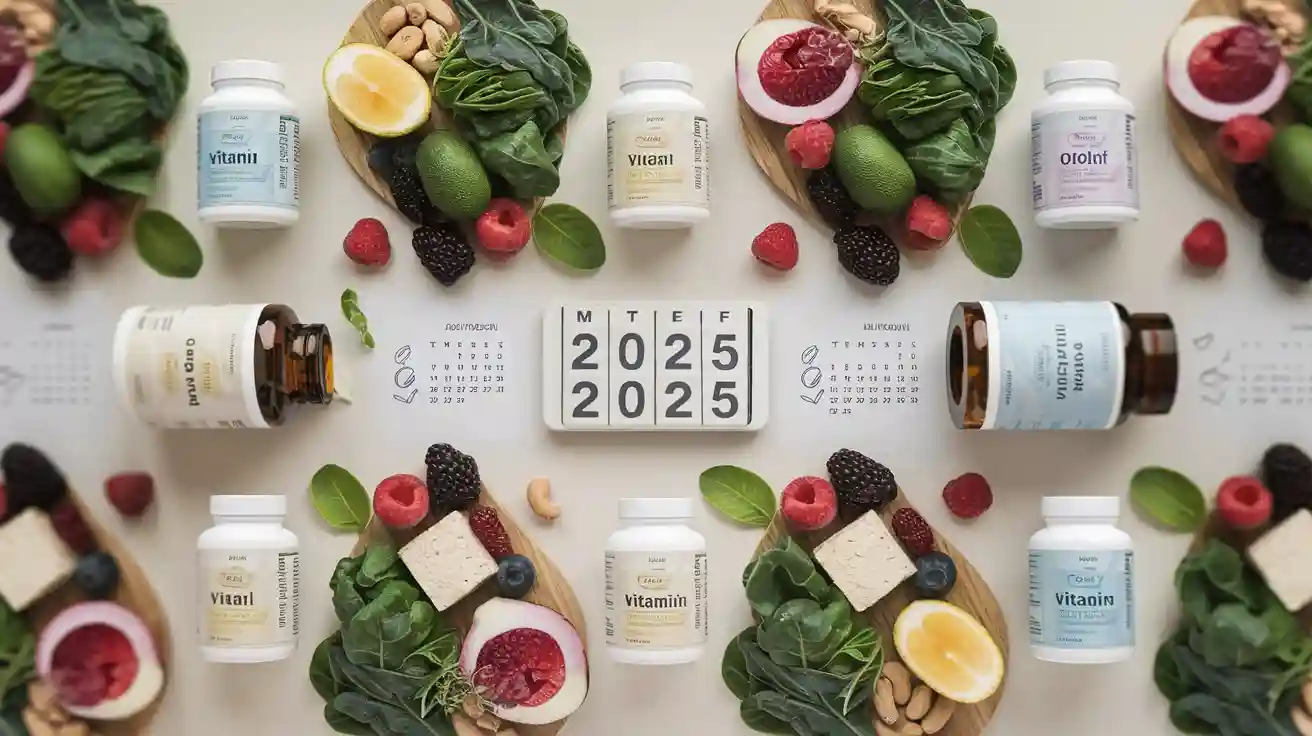
You need to focus on seven essential vitamins in your vegan diet for 2025: B12, D, Riboflavin (B2), Omega-3s, Iron, Calcium, Zinc, and Iodine. These essential vitamins help maintain your micronutrient status and prevent nutritional deficiencies. Many vegans experience dietary deficiencies because plant sources often lack these micronutrients. Watch for signs like tiredness or weakness, and check your micronutrient status regularly.
- Vegans often lack essential vitamins such as B12, D, Calcium, Iron, Zinc, Omega-3s, and Iodine.
- Low vitamin B12 intake can cause tiredness, weakness, and confusion.
Vitamin B12
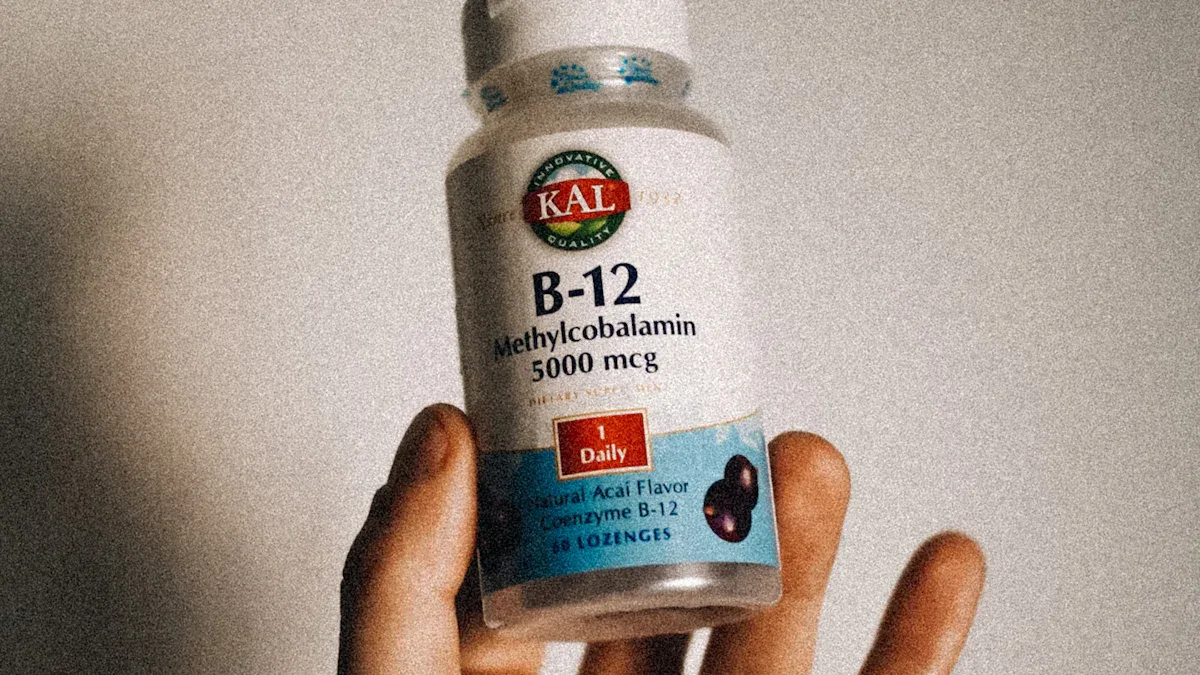
Why It Matters
You need vitamin b12 to keep your body running smoothly. This vitamin helps your nerves work, keeps your brain sharp, and makes sure your blood cells stay healthy. Without enough vitamin b12, you might feel tired, weak, or confused. Scientists say vitamin b12 is crucial for DNA synthesis, red blood cell production, and keeping your nerves working right. If you follow a vegan lifestyle, you face a bigger challenge because plant foods do not give you much vitamin b12. That’s why you need to pay extra attention to this vitamin.
How Much
You might wonder how much vitamin b12 you need every day. Health experts recommend different amounts for different groups. Here’s a quick look:
| Group | Recommended Daily Intake (mcg/day) |
|---|---|
| Males and females age 14+ | 2.4 |
| Pregnant teens and women | 2.6 |
| Breastfeeding teens and women | 2.8 |
Most vegans need to use a supplement to reach these levels. You can choose a daily supplement with ten micrograms or more, take one microgram three times a day, or use a weekly supplement with 2000 micrograms. Dietary supplements make it easy to avoid deficiency.
Vegan Sources
You have a few options for getting vitamin b12 on a vegan diet. Natural sources include shiitake mushrooms, certain algae, and fermented foods, but these do not give you enough for good health. The best way is to use fortified foods and dietary supplements. Try fortified non-dairy milk, meat substitutes, breakfast cereals, nutritional yeast, and vegan spreads. These foods help you meet your needs, but you should still use a supplement to stay safe. If you want to keep your energy up and avoid health problems, make vitamin b12 a regular part of your vegan routine.
Tip: Always check labels for vitamin b12 and talk to your doctor before starting new dietary supplements.
Vitamin D
Importance
You need vitamin d for strong bones and a healthy immune system. Vitamin d helps your body absorb calcium, which keeps your bones hard and your teeth strong. If you do not get enough vitamin d, your bones can become weak and break easily. Your immune system also needs vitamin d to fight off germs and keep you from getting sick. Sunlight helps your skin make vitamin d, but many vegan people do not get enough sun, especially in winter or if you live far from the equator. Studies show that vegan diets often lead to lower vitamin d levels. The EPIC-Oxford study found that vegan people have less vitamin d in their blood than vegetarians or meat-eaters. You need to pay attention to your vitamin d intake to avoid problems with your bones and immune system.
| Evidence Type | Findings |
|---|---|
| Vitamin D’s Role | Modulates bone homeostasis by stimulating calcium absorption and promoting bone mineralization. |
| Sources for Vegans | Fortified plant-based beverages, fortified orange juice, and UV-exposed mushrooms. |
| Deficiency Issues | Vegans often have insufficient vitamin d intake, leading to potential negative effects on bone mineral density. |
| Study Findings | EPIC-Oxford study shows lower 25OH-vitamin d levels in vegans compared to vegetarians and meat-eaters. |
| Supplementation Need | Vitamin d supplementation is necessary for vegans to meet recommended daily allowances. |
Intake
How much vitamin d do you need every day? The answer depends on your age. Most vegan people need at least 600 IU of vitamin d each day. Babies need 400 IU, and older adults need up to 800 IU. If you are pregnant or breastfeeding, you also need 600 IU. You can see the recommended amounts in the chart below.
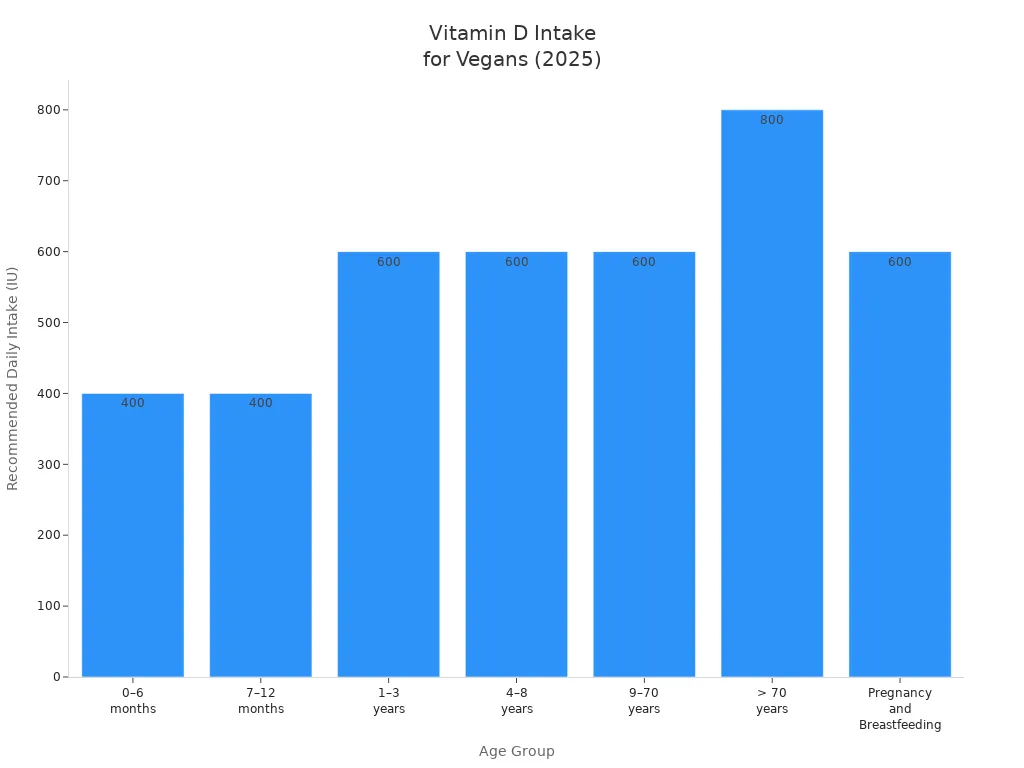
| Age Group | Recommended Daily Intake (IU) |
|---|---|
| 0–6 months | 400 |
| 7–12 months | 400 |
| 1–3 years | 600 |
| 4–8 years | 600 |
| 9–70 years | 600 |
| > 70 years | 800 |
| Pregnancy and Breastfeeding (> 14 years) | 600 |
If you do not get enough vitamin d from food or sunlight, you should use a supplement. Many vegan people need vitamin d supplements to reach the recommended amount.
Sources
You might wonder where to find vitamin d on a vegan diet. Sunlight is one way, but it does not always give you enough. Mushrooms grown under UV light are the only natural vegan source of vitamin d. Most vegan people get vitamin d from fortified foods and supplements. Look for plant milks, plant yogurts, breakfast cereals, orange juice, margarine, tofu, and nutritional yeast with added vitamin d. You can also use vegan vitamin d supplements. Some popular brands include Viridian, Vegetology, Nordic Naturals, Future Kind+, Together Health, and Mary Ruth’s. These supplements use vitamin d3 from plant sources, which works well for your body.
Tip: Always check labels for vitamin d and choose fortified foods or vegan supplements to keep your bones and immune system healthy.
Riboflavin (B2)
Role
Riboflavin, also called vitamin B2, helps your body turn food into energy. You need riboflavin for your cells to work well. This vitamin forms coenzymes called FAD and FMN. These coenzymes carry electrons in redox reactions, which are key for energy production. Riboflavin helps you break down carbohydrates, fats, and proteins. It also supports your body’s electron transport chain, which keeps your energy levels up. Riboflavin helps your body get rid of toxins and drugs with cytochrome P-450. You also get antioxidant protection because riboflavin helps enzymes like glutathione reductase.
Tip: If you want to feel energetic and healthy on a vegan diet, make sure you get enough riboflavin every day.
Needs
You might wonder how much riboflavin you need. Adults should get between 1.1 and 1.6 milligrams each day. Men ages 19 and older need 1.3 mg daily. Women ages 19 and older need 1.1 mg daily. If you follow a vegan lifestyle, you need to pay attention to these numbers. Getting enough riboflavin helps you avoid tiredness and keeps your metabolism working.
| Group | Recommended Daily Intake (mg) |
|---|---|
| Men (19+) | 1.3 |
| Women (19+) | 1.1 |
| Adults | 1.1–1.6 |
Plant Sources
You can find riboflavin in many vegan foods. Some of the best sources include yeast extract spread, almonds, soybeans, mushrooms, spinach, and oats. You can also get riboflavin from asparagus, artichokes, tofu, broccoli, buckwheat, brussels sprouts, sweet potatoes, avocado, brown rice, tempeh, kale, raisins, and tomatoes. Try adding these foods to your meals to boost your riboflavin intake.
- Yeast extract spread: 2.7 mg/100g
- Almonds: 1.2 mg/100g
- Oats: 0.6 mg/100g
- Mushrooms: 0.5 mg/100g
- Spinach: 0.4 mg/100g
If you eat a variety of vegan foods, you can meet your riboflavin needs. You might want to track your intake or talk to a nutritionist if you have questions.
Omega-3s for Vegans
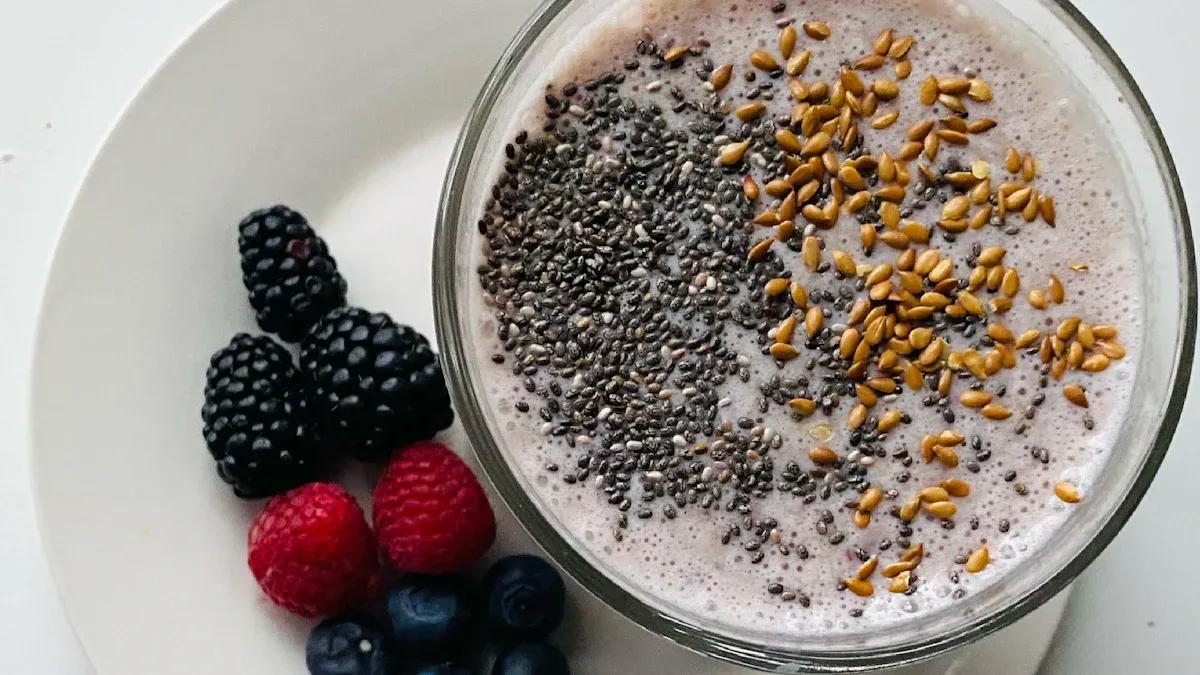
Why Essential
You need omega-3 fatty acids to keep your heart and brain healthy. These nutrients help your body control heart rate and support your memory. If you follow a vegan diet, you may not get enough long-chain omega-3s like EPA and DHA. Your body uses these for brain function and to lower the risk of heart problems. Studies show that vegans often have lower levels of EPA and DHA. This can affect your heart rate and even your mood. Take a look at the table below to see what researchers found:
| Study | Findings |
|---|---|
| Pinto AM et al. (2017) | Vegans had lower DHA and EPA levels, which may affect heart rate variability and cardiovascular health. |
| Tan ZS et al. (2012) | Lower DHA and EPA levels were linked to accelerated brain aging and poorer cognitive performance. |
| Martins JG (2009) | Higher EPA to DHA ratio was more effective in reducing depression symptoms, highlighting the importance of omega-3s in mental health. |
Daily Needs
You might wonder how much omega-3 fatty acids you need every day. Experts say you should aim for more than the current average intake. The table below shows the recommended amounts for vegans in 2025:
| Recommendation Type | Daily Intake (g/day) |
|---|---|
| Current AI for ALA | 1.1 |
| Suggested Intake | 2.2 – 4.4 |
If you want to keep your heart and brain working well, try to reach the higher suggested intake.
Vegan Options
You have several choices for getting omega-3 fatty acids on a vegan diet. Plant foods like flaxseed, chia seeds, walnuts, and hemp seeds give you ALA, but your body does not turn much of it into EPA and DHA. That makes it hard to get enough long-chain omega-3. Algae-based supplements solve this problem. These supplements give you direct EPA and DHA, just like fish oil does. Many vegan people use algae-based omega-3 supplements to keep their levels up. Here are some tips for boosting your intake:
- Eat flaxseed, chia seeds, walnuts, and hemp seeds for ALA.
- Choose algae-based omega-3 supplements for EPA and DHA.
- Check labels for vegan-friendly products.
- Add omega-3-rich foods to your meals every day.
Tip: Algae-based supplements help you maintain healthy omega-3 fatty acids levels and support your brain as you age.
Iron in a Vegan Diet
Importance
You need iron to help your body make red blood cells and carry oxygen. Iron keeps your energy up and helps your brain work well. If you follow a vegan diet, you face a bigger challenge with iron absorption. Plant foods give you non-heme iron, which your body does not absorb as easily as heme iron from animal foods. Sometimes, your body adapts and absorbs more non-heme iron, especially if you eat a vegan diet for a long time. Still, you need to watch out for iron deficiency. Many vegan women and teenage girls do not get enough iron and may develop iron deficiency or anemia. You might feel tired, weak, or have trouble focusing if you have iron deficiency.
| Evidence Point | Description |
|---|---|
| Iron Absorption Mechanism | Heme iron is absorbed directly, while non-heme iron absorption is regulated. |
| Adaptation in Vegans | Vegans may adapt by absorbing more non-heme iron due to lower hepcidin. |
| Dietary Factors | Phytates can block iron absorption but may also help your body adapt. |
Requirements
You need to know how much iron to get every day. Vegan diets require more iron because your body absorbs less non-heme iron. Experts say you should aim for 1.8 times more iron than people who eat meat. Take a look at this table:
| Diet Type | Recommended Iron Intake | Bioavailability of Iron | Notes |
|---|---|---|---|
| Vegans | 1.8 times higher than omnivores | Non-heme iron (approx. 3.7%) | Vegan diets need more iron due to lower absorption. |
| Omnivores | Standard recommendations | Heme iron (approx. 25%) | Meat eaters absorb iron better. |
Most vegan men meet the iron goal of 8 mg per day. Many vegan women need 18 mg per day but often fall short. Iron deficiency is common in vegan women and girls, so you need to check your intake.
Best Sources
You can find iron in many vegan foods. Some of the best sources include:
- Blackstrap molasses
- Lentils
- Tofu and tempeh
- Spinach
- Beans
- Swiss chard
Try to eat these foods often to lower your risk of iron deficiency. You can boost iron absorption by eating vitamin C-rich foods like oranges or bell peppers with your meals. Avoid drinking tea or coffee with meals because they block iron absorption. If you worry about iron deficiency, talk to your doctor or a dietitian.
Tip: Mix iron-rich vegan foods with vitamin C sources to help your body absorb more iron and keep your energy up.
Calcium
Bone Health
You need calcium to keep your bones and teeth strong. If you don’t get enough, your bones can become weak and break easily. Calcium helps your body build bone tissue and keeps your teeth healthy. Many vegan people have lower calcium intake compared to vegetarians and meat-eaters. Take a look at this chart to see how calcium intake has changed over time:
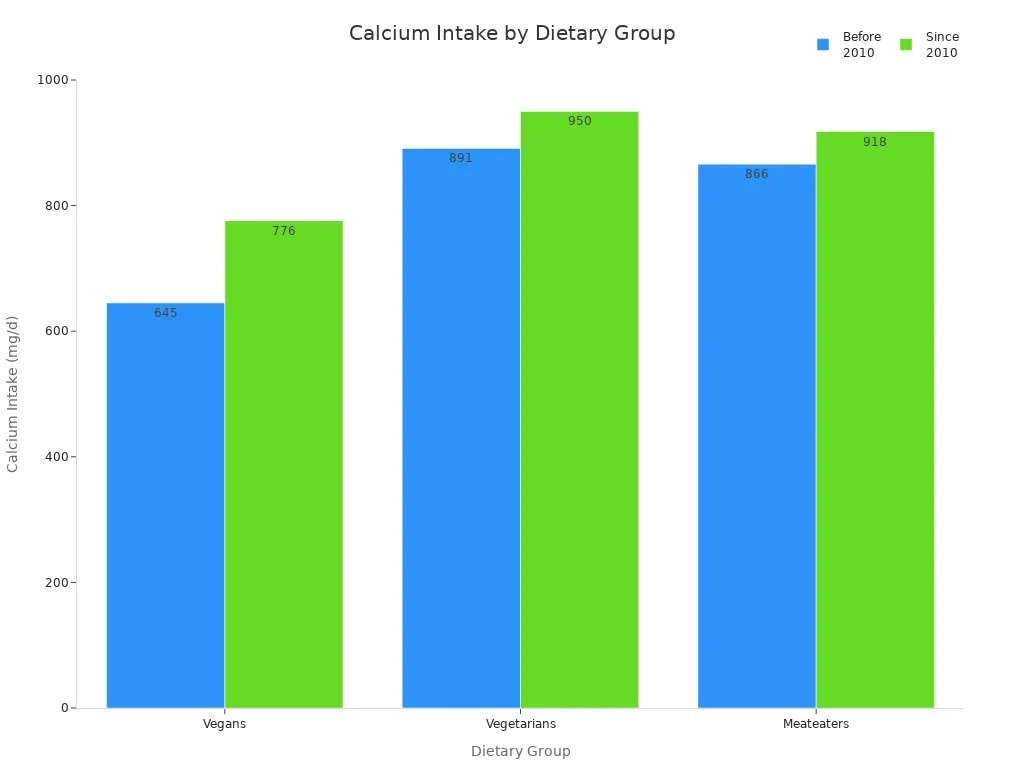
| Dietary Group | Calcium Intake (mg/d) Before 2010 | Calcium Intake (mg/d) Since 2010 |
|---|---|---|
| Vegans | 645 | 776 |
| Vegetarians | 891 | 950 |
| Meateaters | 866 to 955 | 918 to 1,017 |
If you follow a vegan diet, you should aim for enough calcium to prevent osteoporosis and keep your bones healthy.
How Much
You might wonder how much calcium you need every day. The U.S. recommends that adults get between 1,000 and 1,200 mg of calcium daily. For vegan adults in 2025, the recommended intake looks like this:
| Age Group | Recommended Calcium Intake (mg/day) |
|---|---|
| 18-24 years | 1000 |
| 25+ years | 950 |
If you don’t reach these numbers, your bones may not stay strong as you get older.
Vegan Sources
You can find calcium in many vegan foods. Some of the best sources include:
- fortified plant milk (almond, soya, oat, coconut)
- plant-based yogurt alternatives (soya yogurt, coconut yogurt)
- green leafy vegetables (spinach, kale, turnip greens)
- fresh fruit (blackberries, rhubarb, oranges)
- dried fruit (figs, apricots, dates)
- beans and pulses (soya beans, chickpeas, kidney beans)
- fortified foods and drinks (plant yogurts, cereals, fortified orange juice)
- blackstrap molasses
Try adding these foods to your meals every day. You can also use calcium-set tofu or supplements if you need extra help. Vitamin D helps your body absorb calcium, so consider a supplement if you don’t get much sunlight.
Tip: Mix different vegan calcium sources in your meals to keep your bones and teeth healthy.
Zinc for Vegans
Why Needed
You need zinc to keep your immune system strong and help your body heal wounds. Zinc helps your body fight germs by boosting the activity of immune cells like neutrophils and NK cells. These cells attack viruses and bacteria. Zinc also helps B cells and T cells work better, which means your body can make more antibodies and fight off infections. If you do not get enough zinc, you might get sick more often or heal slowly after cuts and scrapes. Zinc helps your body clear bacteria, calm inflammation, and repair tissues. When you eat a vegan diet, you need to pay extra attention to zinc because plant foods do not always give you enough.
Tip: Zinc helps your body fight germs and heal wounds faster. Make sure you get enough every day.
Intake
You might wonder how much zinc you need. Most vegan adults should aim for 5 to 10 mg of zinc each day. People who eat animal foods usually need about 12 mg. Studies show that vegans often get less zinc than others because plant foods have lower bioavailability. This means your body does not absorb zinc from plants as easily. The average vegan gets about 7 mg of zinc daily, which is less than vegetarians and flexitarians. You need to watch your intake and choose foods that help your body absorb more zinc.
| Diet Type | Recommended Zinc Intake (mg/day) | Average Intake (mg/day) |
|---|---|---|
| Vegan | 5–10 | 7.12 |
| Vegetarian | 5–10 | 8.58 |
| Flexitarian | 5–10 | 9.61 |
| Omnivore | ~12 | 11.99 |
Sources
You can find zinc in many vegan foods. Some of the best sources include:
- Oats, brown rice, and wholegrain bread
- Lentils, adzuki beans, black beans, and green peas
- Tofu, tempeh, and miso paste
- Pumpkin seeds, sesame seeds, hemp seeds, chia seeds, and flax seeds
- Cashews, pecans, pine nuts, almonds, walnuts, and avocados
- Shiitake and white mushrooms
- Fortified breakfast cereals
You can boost zinc absorption by using simple kitchen tricks:
- Soak legumes before cooking
- Sprout seeds and grains
- Ferment whole grains and soy products
- Eat protein-rich foods with zinc sources
Try mixing these foods into your meals every day. If you follow a vegan diet, you need to plan your meals to get enough zinc and help your body absorb it.
Iodine
Thyroid Health
Your thyroid needs iodine to work well. This tiny gland in your neck controls how fast your body uses energy. If you don’t get enough iodine, you can develop iodine deficiency, which may slow down your metabolism and make you feel tired. People who follow a vegan diet often miss out on iodine-rich foods, so you need to pay extra attention. Studies show that vegans who skip iodine supplements have a higher risk of iodine deficiency than people who eat animal products. You might notice problems like feeling cold, weak, or having trouble focusing. The table below shows why iodine matters for your thyroid:
| Key Findings | Implications |
|---|---|
| Iodine is essential for thyroid hormone formation. | Iodine deficiency can lead to thyroid dysfunction, especially for vegans. |
| Main dietary sources of iodine are often excluded in vegan diets. | Vegans are at increased risk of iodine deficiency, impacting thyroid health. |
| Thyroid diseases are more common in vegans and vegetarians. | You need to monitor your iodine intake to keep your thyroid healthy. |
Tip: If you want to keep your energy up and avoid thyroid problems, make sure you get enough iodine every day.
Needs
You need to know how much iodine to get. Most adults should aim for 150 micrograms of iodine daily. In the UK, the recommendation is 140 micrograms. Don’t go overboard, though—the safe upper limit is 1,100 micrograms. If you follow a vegan diet, you should use iodized salt or a supplement to meet your needs. Missing out can lead to iodine deficiency, which affects your thyroid and overall health.
- Recommended daily iodine for adults: 150 µg
- UK recommendation: 140 µg per day
- Safe upper limit: 1,100 µg per day
Vegan Sources
You have several options for getting iodine on a vegan diet. The easiest way is to use iodized salt. Just half a teaspoon gives you about 150 micrograms. Sea vegetables like nori, wakame, and dulse flakes are also great sources. One tablespoon of wakame or two sheets of nori can meet your daily needs. Kombu is super high in iodine, so you should avoid it if you have thyroid issues. Other plant foods like wholegrains, green beans, kale, and organic potatoes with skin have some iodine, but not enough to prevent iodine deficiency. Seaweed is an excellent source, but you need to watch your intake to avoid getting too much or too little.
- Iodized salt: 1/2 teaspoon daily
- Sea vegetables: wakame, nori, dulse flakes
- Other plant foods: wholegrains, green beans, kale, potatoes with skin
Note: If you want to avoid iodine deficiency, plan your vegan meals carefully and consider using supplements or iodized salt.
You can thrive on a vegan diet when you keep an eye on these 7 vitamins. Regular checks and smart choices help you stay healthy. Here are some key strategies:
- Eat fortified foods and a variety of plants.
- Pair iron-rich foods with vitamin C.
- Use supplements when needed.
| Nutrient | Why It Matters |
|---|---|
| B12 | Nerve and blood health |
| Iodine | Thyroid function |
| Vitamin D | Bone strength |
| Calcium | Bone strength |
| Omega-3s | Brain health |
| Iron | Energy |
| Zinc | Immunity |
A dietitian can help you find what works best for you. With a little planning, you can feel your best and enjoy every meal!
FAQ
Can you get all these vitamins from food alone on a vegan diet?
You can get some vitamins from food, but not all. You usually need supplements for B12, vitamin D, and sometimes iodine.
What happens if you miss one of these vitamins?
You might feel tired, weak, or get sick more often. Your body needs all these vitamins to work well every day.
Do kids and teens need different amounts of these vitamins?
Yes! Kids and teens need different amounts as they grow. You should check with a doctor or dietitian for the right amounts.

Poseidon
Master of Nutritional Epidemiology, University of Copenhagen, Herbal Functional Nutrition Researcher
Focus: The scientific application of natural active ingredients such as Tongo Ali, Horny Goat Weed, and Maca to sexual health and metabolic regulation.
Core Focus:
Men: Use a combination of Tongo Ali (an energizing factor) + Maca (an energy reserve) to improve low energy and fluctuating libido.
Women: Use a combination of Horny Goat Weed (a gentle regulator) + Maca (a nutritional synergist) to alleviate low libido and hormonal imbalances.
Stressed/Middle-Aged Adults: This triple-ingredient synergy supports metabolism, physical strength, and intimacy.
Product Concept:
Based on traditional applications and modern research (e.g., Tongo Ali promotes testosterone-enhancing enzyme activity, and icariin provides gentle regulation), we preserve core active ingredients and eschew conceptual packaging—using natural ingredients to address specific needs.
Simply put: I'm a nutritionist who understands "herbal actives." I use scientifically proven ingredients like Tongo Ali, Epimedium, and Maca to help you make "sexual health" and "nutritional support" a daily routine.
